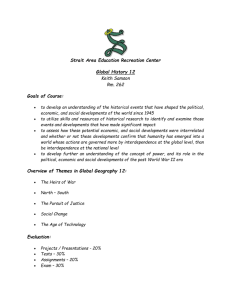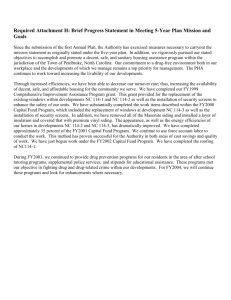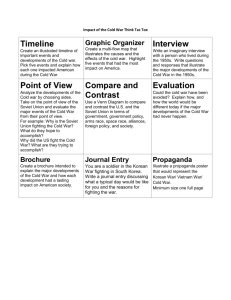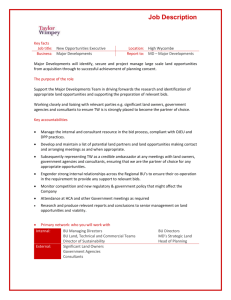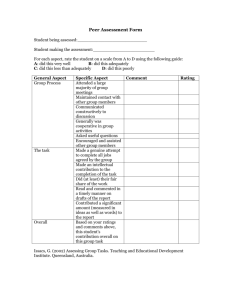Student_as_Producer_self-assessment_tool-2012
advertisement
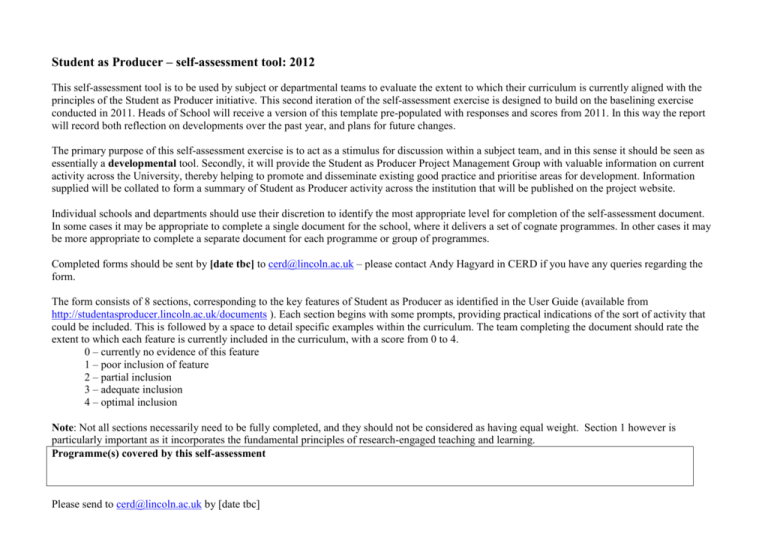
Student as Producer – self-assessment tool: 2012 This self-assessment tool is to be used by subject or departmental teams to evaluate the extent to which their curriculum is currently aligned with the principles of the Student as Producer initiative. This second iteration of the self-assessment exercise is designed to build on the baselining exercise conducted in 2011. Heads of School will receive a version of this template pre-populated with responses and scores from 2011. In this way the report will record both reflection on developments over the past year, and plans for future changes. The primary purpose of this self-assessment exercise is to act as a stimulus for discussion within a subject team, and in this sense it should be seen as essentially a developmental tool. Secondly, it will provide the Student as Producer Project Management Group with valuable information on current activity across the University, thereby helping to promote and disseminate existing good practice and prioritise areas for development. Information supplied will be collated to form a summary of Student as Producer activity across the institution that will be published on the project website. Individual schools and departments should use their discretion to identify the most appropriate level for completion of the self-assessment document. In some cases it may be appropriate to complete a single document for the school, where it delivers a set of cognate programmes. In other cases it may be more appropriate to complete a separate document for each programme or group of programmes. Completed forms should be sent by [date tbc] to cerd@lincoln.ac.uk – please contact Andy Hagyard in CERD if you have any queries regarding the form. The form consists of 8 sections, corresponding to the key features of Student as Producer as identified in the User Guide (available from http://studentasproducer.lincoln.ac.uk/documents ). Each section begins with some prompts, providing practical indications of the sort of activity that could be included. This is followed by a space to detail specific examples within the curriculum. The team completing the document should rate the extent to which each feature is currently included in the curriculum, with a score from 0 to 4. 0 – currently no evidence of this feature 1 – poor inclusion of feature 2 – partial inclusion 3 – adequate inclusion 4 – optimal inclusion Note: Not all sections necessarily need to be fully completed, and they should not be considered as having equal weight. Section 1 however is particularly important as it incorporates the fundamental principles of research-engaged teaching and learning. Programme(s) covered by this self-assessment Please send to cerd@lincoln.ac.uk by [date tbc] Section 1 - Discovery: Student as Producer Prompts Students are familiar with the research work of the department Students have the opportunity to contribute to the department’s research work Students at all levels work on collaborative projects where learning is driven by inquiry All students complete a substantial piece of independent research Students are introduced to a range of appropriate research methods and skills, including ethics The development of research skills is explicit in programme learning outcomes Students are encouraged to make explicit how the research skills developed contribute to their personal development and employability Students have the opportunity to present and/or publish their own research work in a public forum Examples within the curriculum (2011) Update 2012 (to be copied from 2011 baseline exercise) Planned developments (2011) Reflections on developments since 2011 / Planned Developments for 2012/13 (to be copied from 2011 baseline exercise) Overall score for this aspect (2011) 0 1 2 3 Please send to cerd@lincoln.ac.uk by [date tbc] 4 Overall score for this aspect (2012) 0 1 2 3 4 Section 2 – Technology in Teaching: Digital Scholarship Prompts Technology is used to promote collaboration amongst and between staff and students Learning objects and resources are embedded in digital delivery The technological environment is designed to be accessible to students with diverse needs Examples within the curriculum (2011) Update 2012 (to be copied from 2011 baseline exercise) Planned developments (2011) Reflections on developments since 2011 / Planned Developments for 2012/13 (to be copied from 2011 baseline exercise) Overall score for this aspect (2011) 0 1 2 3 Please send to cerd@lincoln.ac.uk by [date tbc] 4 Overall score for this aspect (2012) 0 1 2 3 4 Section 3 – Space and Spatiality: Learning Landscapes in HE Prompts Use of formal and informal spaces Use of the Library and other spaces to deliver enhanced teaching experiences Space is used to facilitate participation and collaboration Teaching is accessible to students with diverse needs Examples within the curriculum (2011) Update 2012 (to be copied from 2011 baseline exercise) Planned developments (2011) Reflections on developments since 2011 / Planned Developments for 2012/13 (to be copied from 2011 baseline exercise) Overall score for this aspect (2011) 0 1 2 3 Please send to cerd@lincoln.ac.uk by [date tbc] 4 Overall score for this aspect (2012) 0 1 2 3 4 Section 4 – Assessment and Feedback: Active Learning in Communities of Practice Prompts Assessments reflect the discovery mode of teaching and learning Students are involved in the process of designing assessments and marking criteria Students are involved in marking and feedback through peer, group and self-assessment Examples within the curriculum (2011) Update 2012 (to be copied from 2011 baseline exercise) Planned developments (2011) Reflections on developments since 2011 / Planned Developments for 2012/13 (to be copied from 2011 baseline exercise) Overall score for this aspect (2011) 0 1 2 3 Please send to cerd@lincoln.ac.uk by [date tbc] 4 Overall score for this aspect (2012) 0 1 2 3 4 Section 5 – Research and Evaluation: Scholarship of teaching and learning Prompts Tutors research their own teaching and learning practices using sound research methods and methodologies Students and staff contribute to pedagogical research into their teaching and learning experiences Examples within the curriculum (2011) Update 2012 (to be copied from 2011 baseline exercise) Planned developments (2011) Reflections on developments since 2011 / Planned Developments for 2012/13 (to be copied from 2011 baseline exercise) Overall score for this aspect (2011) 0 1 2 3 Please send to cerd@lincoln.ac.uk by [date tbc] 4 Overall score for this aspect (2012) 0 1 2 3 4 Section 6 – Student Voice: Diversity, Difference and Dissensus Prompts Students are actively engaged in the design and delivery of their programmes Students contribute to programme review Students support the learning of other students Examples within the curriculum (2011) Update 2012 (to be copied from 2011 baseline exercise) Planned developments (2011) Reflections on developments since 2011 / Planned Developments for 2012/13 (to be copied from 2011 baseline exercise) Overall score for this aspect (2011) 0 1 2 3 Please send to cerd@lincoln.ac.uk by [date tbc] 4 Overall score for this aspect (2012) 0 1 2 3 4 Section 7 – Support for research-based teaching and learning through expert engagement with information resources Prompts Programmes engage with the Library to integrate information resources and information handling skills Academic Subject Librarians work alongside academics and students to develop research and information skills Examples within the curriculum (2011) Update 2012 (to be copied from 2011 baseline exercise) Planned developments (2011) Reflections on developments since 2011 / Planned Developments for 2012/13 (to be copied from 2011 baseline exercise) Overall score for this aspect (2011) 0 1 2 3 Please send to cerd@lincoln.ac.uk by [date tbc] 4 Overall score for this aspect (2012) 0 1 2 3 4 Section 8 – Creating the future: employability, enterprise, postgraduate, beyond employability Prompts Students gain real-life experiences beyond the university itself The curriculum includes research activities based on work-based learning and employer engagement Examples within the curriculum (2011) Update 2012 (to be copied from 2011 baseline exercise) Planned developments (2011) Reflections on developments since 2011 / Planned Developments for 2012/13 (to be copied from 2011 baseline exercise) Overall score for this aspect (2011) 0 1 2 3 Please send to cerd@lincoln.ac.uk by [date tbc] 4 Overall score for this aspect (2012) 0 1 2 3 4 Document completed by: Date Please send to cerd@lincoln.ac.uk by [date tbc]
